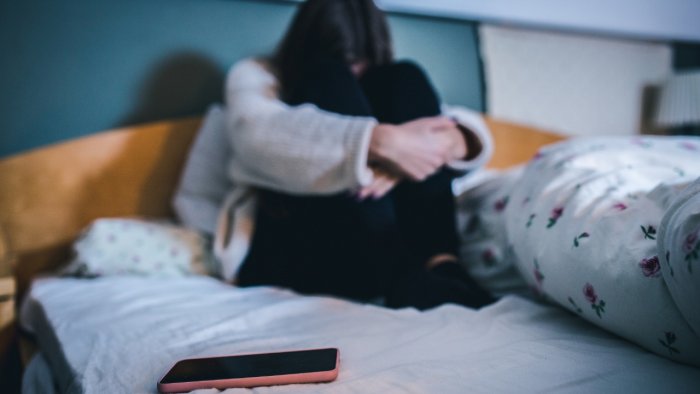Fifty-eight per cent out of 14,000 girls observed across the globe have experienced varied forms of online harassments says a study conducted by Plan International on the ‘Experiences of Girls Being Online on Social Media Platforms’.
The study, which was conducted in June and July 2020 in 22 countries including Ghana with a structured questionnaire, examined the behaviours, attitudes and beliefs that limited girls’ freedom and opportunities on social media platforms.
The report was presented when Plan International Ghana joined the world to commemorate ‘International Day of the Girl Child”, which falls on October 8 of every year, in Accra.
The Acting Head of Programmes of Plan International Ghana, Vera Abbey, who presented the report, said 28 per cent of the total number studied faced harassments on Facebook, 14 per cent on WhatsApp, 5 per cent on Instagram, 2 per cent on Twitter, 1 per cent on Snapchat, 1 per cent on YouTube, and 1 per cent on other platforms.
The report also said online harassments of girls start from age 8 and majority were harassed for the first time between the ages of 14 to 16.
Eighty-five per cent faced sexual harassments; 64 per cent, abusive and insulting language; 57 per cent, threats of sexual violence; 50 per cent, purposeful embarrassments; and 43 per cent, body-shaming attacks, she said.
Madam Abbey said 42 per cent had threats of physical violence; 40 per cent, stalking and annoyance; and 25 per cent were attacked with racists comments among other types on online harassments.
Disclosing the effects of the harassments, she said, 24 per cent of the girls afterwards felt physically unsafe, 43 per cent lost self-esteem or self-confidence, 42 per cent felt mentally or emotionally stressed and 18 per cent encountered problems at school.
She said 71 per cent of the respondents said the harassments were triggered due to their style and appearances on social media, 31 per cent believed it was due to their gender identity, 18 per cent said it was as a result of sexual orientation, nine per cent were convinced it was from race or ethnicity, seven per cent said it was due to political views, and five per cent faced it because they were living with disabilities.
Madam Abbey recommended that government reformed legislative frameworks to deal with online harassment and violence against girls and young women, adding that, laws be made to hold social media platforms accountable.
It also suggested that social media companies or organizations created stronger, effective and accessible reporting mechanisms specific to online gender-based violence to hold perpetrators to account.
Civil Society Organisations were also encouraged to develop and deliver digital citizenship education and awareness on the opportunities and online risks with a focus on online abuse.
The Country Director Plan International Ghana, Solomon Tesfamariam, said abuse and harassments facing girls including online, were fast becoming major threats, with very limited measures to protect them, especially in these times of the COVID-19 pandemic.
He said Plan International Ghana, therefore, adopted the theme: “Freedom Online” with the hashtag “#FreeToBeOnline” to support girls against abuse and harassment on social media.
For his part, online violence silenced girls and served as a barrier to their leadership, hence, the need to sensitise them on the concept of online safety and harassments from different perspectives.
Mr Tesfamariam said it was clear that little was being done to protect girls and young women online, meanwhile, the treatment they received was unacceptable, frightening and must be stopped.
The Deputy Minister of Education in charge of Technical, Vocational Education and Training, Gifty Twum Ampofo, said the world was in an era where it could not do without the internet.
She advised girls and young ladies not to allow themselves to be drawn into unacceptable behaviours on social media as a result of their beliefs, culture and influences from peers and the contemporary world.
“My girls, you have to be smart and set your priorities right. Many girls have been abused and murdered because of one picture they shared on social media or some expressions they made. Don’t allow yourselves to be moved by words from men like you are beautiful, and smart. Don’t allow yourselves to be flattered, because for the tablets, you will have them soon,” she advised.
She said Ghana had adopted the United Nations ‘Safe School Declaration’ and the Ministry had received funding to put together a ‘Safe School Policy’ to safeguard children.
Latest Stories
-
Yaw Ampofo Ankrah calls for Kurt Okraku and Executive Council to resign over AFCON failure
3 mins -
Coalition of teachers to boycott December election over unpaid salary arrears
6 mins -
Uphold ethics in fight against fraud – First National Bank CEO
11 mins -
CHRAJ recommends forensic audit of National Cathedral project
12 mins -
I cried every three days at the beginning of my career – Gyakie
15 mins -
#ChoosePeaceGh Campaign: JoyNews partners Catholic Relief Services beyond 2024 December 7 Elections
23 mins -
CHRAJ report scratched the surface on “the double identity” of Rev. Kusi Boateng – Ablakwa
43 mins -
Elections: Akufo-Addo calls for unified front to combat political instability
54 mins -
Alidu Seidu ruled out for the season after suffering raptured ACL
55 mins -
Women advocate for tax waivers, clear timelines for implementation of economic policies
59 mins -
Disinformation, misinformation making our work tedious – NCCE
1 hour -
COP29: Africa expected more in new Climate Finance deal
1 hour -
Vice President Bawumia commends Lands Commission for digitalising its operations
1 hour -
By age 7, I knew everything I wanted to do in life – KOD
1 hour -
10 GWCL customers in Ashanti north celebrated for loyalty, timely water bill payment
1 hour

